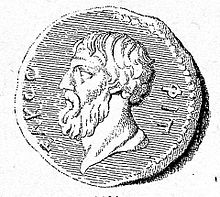Pittacos
Pittakos ( ancient Greek Πιττακὸς ὁ Μυτιληναῖος or Πιττακὸς ὁ Λέσβιος also Φιττακός * 651/650 v. Chr .; † about 570 v. Chr.) Was dissolved in Mytilene on Lesbos in the struggle between nobility and people on the one hand and various noble fractions ( stasis ) on the other called to the aisymnet .
With the portrayal of Alcaios and his involvement in the aristocratic quarrels of Mytilenes, the controversial image of pittacos in research is related to the question of whether pittacos was an exponent of an aristocratic society ( tyrant ) or an anti-aristocratic reformer. Together with Pittacus, the older brothers of Alkaios are said to have overthrown the tyrant Melanchros ; in the subsequent stasis eventually could Myrsilos prevail as a new tyrant. Pittakos, Alkaios and his brothers then went into exile, from where Pittakos made peace with Myrsilos to the horror of Alcaios. Alkaios struck implacable tones in his poems against Pittacus, even when Pittacus had been chosen as an aisymnet . Pittakos is said to have been of the lowest origin and obese; Alkaios polemicizes here against the former ally. According to the poet, Pittakos married a woman from the Atreiden family .
As a reconciler of the divided social groups, Pittakos is said to have been in office for ten years. He made the first written laws . Presumably, Sappho had to leave Lesbos on his orders.
After the conflict was over, he voluntarily resigned from office, pointing out that it was too difficult to be virtuous in the long term. He was considered one of the seven wise men and was mentioned by Diogenes Laertios in his famous work on the philosophers.
As a general, he is said to have led the Mytilenians in battle against the Athenians . With their leader Phrynon (Olympic champion in pankration ) he agreed to fight the fight only among the leaders. In close combat he threw a net over Phrynon and defeated / killed him; thereby the battle against Athens was won without further bloodshed.
Quotes

Demetrios of Phaleron ascribes the following sayings to him. Pittakos, son of Hyrras, from Lesbos said ( Πιττακὸς ᾿Υρραδίου Λέσβιος ἔφη ):
| German | Greek |
|---|---|
| Know the timing. | Γίγνωσκε καιρόν. |
| Do not say what you intend to do; because if you don't succeed, you will be laughed at. | ὃ μέλλεις ποιεῖν, μὴ λέγε ἀποτυχὼν γὰρ καταγελασθήσῃ. |
| What you think of your neighbor do not do yourself. | ὃσα νεμεσᾷς τῷ πλησίον, αὐτὸς μὴ ποίει. |
| Entrusted goods give back. | Παρακαταθήκας ἀπόδος. |
| Do not speak ill of your friend and do not speak well of your enemy, because that would be illogical. |
Τὸν φίλον κακῶς μὴ λέγε, μηδ᾿ εὖ τὸν ἐχθρόν • ἀσυλλόγιστον γὰρ τὸ τοιοῦτον. |
| The land is reliable, the sea unreliable. | Πιστὸν γῆ, ἄπιστον θάλασσα. |
| Profit is insatiable. | Ἄπληστον κέρδος. |
literature
- Klaus Bringmann : In the shadow of the palaces. History of Early Greece. From the Dark Centuries to the Persian Wars , Munich: CH Beck 2016, 186–190.
- Justus Cobet : Pittacus. In: The New Pauly (DNP). Volume 9, Metzler, Stuttgart 2000, ISBN 3-476-01479-7 , Sp. 1054-1056.
- Sabine Tausend: The arduous path to the wise: Pittacus in the poems of Alcaios. In: " I'll be gone": Festschrift for a traveler: Thuri Lorenz on his 85th birthday, ed. by Gabriele Koiner and Ute Lohner-Urban (publications by the Institute for Archeology at the Karl-Franzens University Graz, 13), Vienna: Phoibos, 2016, 231–235.
Web links
Remarks
- ↑ Deviating from this, the spelling ΦΙΤΤΑΚΟΣ Phittakos can be found on a coin from the Middle Roman Empire . For the coin see Barclay Vincent Head : Historia Numorum. A Manual of Greek Numismatics. Second edition. Clarendon Press, Oxford 1911, p. 562 ( digitized ). Illustration by Friedrich Imhoof-Blumer : portrait heads on ancient coins of Hellenic and Hellenized peoples. Teubner, Leipzig 1885 Plate VIII, 26 ( digitized version ). The same spelling is found in a poem fragment on the Papyrus Oxyrhynchus X 1234 Fr. 2 ( digitized version ). On this fragment, see Ulrich von Wilamowitz-Moellendorff : Neue Lesbische Lyrik (Oxyrynchos-Papyri X). In: New year books for classical antiquity, history and German literature and for pedagogy. 17th year, Volume 33, 1914, pp. 225–247, here: pp. 236–242 ( digitized version ).
- ↑ Aristotle: Politiká . 1285 a29-b7.
- ^ Rainer Bernhardt : Luxury criticism and expenditure restrictions in the Greek world (= Historia individual writings. Issue 168). Steiner, Stuttgart 2003, p. 87.
- ↑ a b Klaus Bringmann: In the shadow of the palaces. History of Early Greece. From the Dark Centuries to the Persian Wars . CH Beck, Munich 2016, p. 186-190 .
| personal data | |
|---|---|
| SURNAME | Pittacos |
| ALTERNATIVE NAMES | Πιττακὸς ὁ Μυτιληναῖος (Greek); Πιττακὸς ὁ Λέσβιος (Greek) |
| BRIEF DESCRIPTION | Aisymnet in Mytilene on Lesbos |
| DATE OF BIRTH | 651 BC BC or 650 BC Chr. |
| DATE OF DEATH | around 570 BC Chr. |
